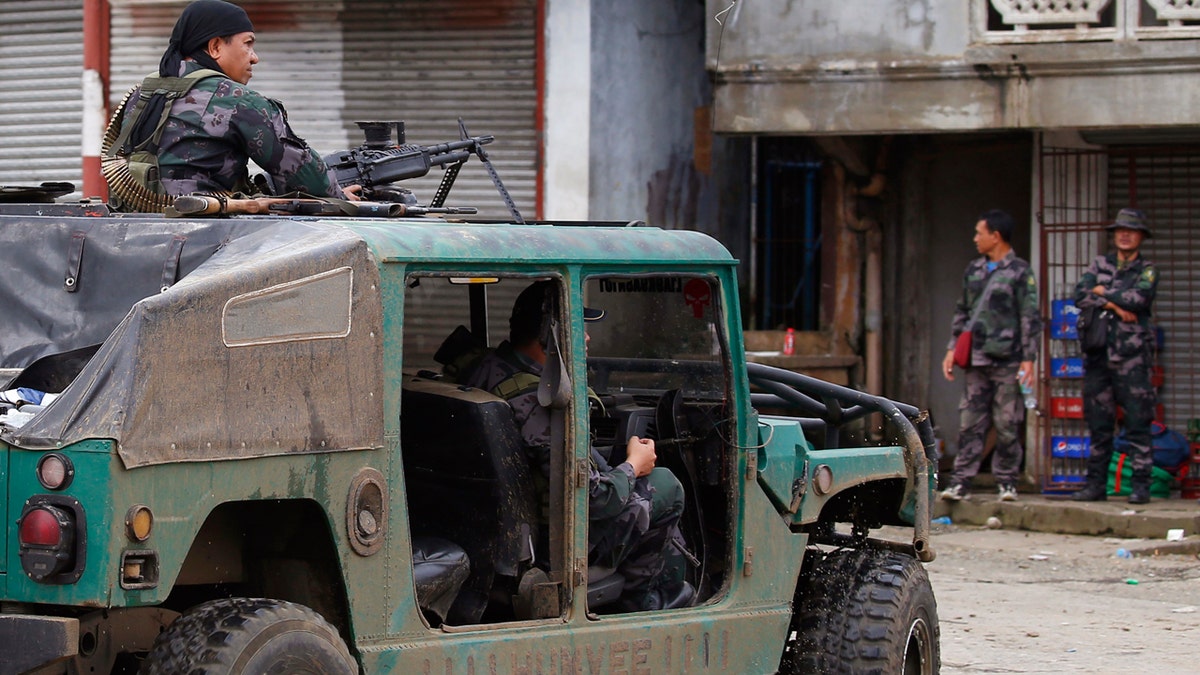
Police patrol the streets of Marawi city as government troops battle with Muslim militants who continue to hold their ground in some areas of the city for almost a week Monday, May 29, 2017 in southern Philippines. (AP Photo/Bullit Marquez)
Recent violence in the southern Philippines, including the beheading of a police chief, has fueled concerns the Islamic State group's violent ideology is gaining a foothold in the region where a Muslim separatist rebellion has raged for decades.
In the past week, gunmen linked to Isnilon Hapilon, a commander of the Abu Sayyaf militant group who has pledged allegiance to ISIS, swept into Marawi City on the island of Mindanao, burning buildings, seizing a Catholic priest and his worshippers and raising the black flag of the terror group.
The death toll since Tuesday is close to 100, according to the AP, which includes 16 civilians, 61 militants, 11 soldiers, and four police officers.
President Rodrigo Duterte declared martial law in the south through mid-July after the militants went on the deadly rampage in Marawi, a lakeside city dotted with hundreds of mosques, following an unsuccessful military raid to capture Hapilon.
As many as 180,000 people, about 90 percent of the population, have fled the usually bustling town due to the violence, according to Reuters.
On Monday, attack helicopters were seen streaking low over Marawi, firing rockets at militant hideouts, as heavily armed soldiers went house to house in search of fighters. Thousands of people have fled the cityi, leading a local official to describe it as like "a ghost town," according to SkyNews.
The army insists the drawn-out fight is not a true sign of the militants' strength, and that the military has held back to spare civilians' lives.
"They are weak," Gen. Eduardo Ano, the military chief of staff, told the Associated Press while speaking at a hospital where injured soldiers were being treated. "It's just a matter of time for us to clear them from all their hiding places."
Related stories...
The group of fighters however have turned out to be remarkably well-armed and resilient. In recent years, small militant groups in the Philippines, Indonesia and Malaysia have begun unifying under the banner of ISIS.
Last week, Jose Calida, the top Philippine prosecutor, said that Indonesians and Malaysians were among the fighters in Marawi, and that the violence on the large southern island of Mindanao "is no longer a rebellion of Filipino citizens."
Rohan Gunaratna, a terrorism expert at Singapore's S. Rarajatnam School of International Studies, told the AP that ISIS and the smaller regional groups are working together to show their strength and declare a Philippine province part of the caliphate that ISIS says it created in the Middle East.
The ongoing fighting in Marawi, along with smaller battles elsewhere in the southern Philippines, may be precursors to declaring a province, which would be "a huge success for the terrorists,' he added.
Last week, two suicide bombings in Jakarta, Indonesia, killed three police officers, an attack claimed by ISIS.
While Indonesia has been fighting local militants since 2002, the rise of the Islamic State group has breathed new life into those militant networks and raised concern about the risk of Indonesian fighters returning home from the Middle East.
Experts have warned that as ISIS is weakened in Syria and Iraq, battered by years of American-led attacks, the region in the Philippines could become a focal point for regional fighters.
Southeast Asian fighters fleeing the Middle East "could look to Mindanao to provide temporary refuge as they work their way home," said a report late last year by the Jakarta-based Institute for Policy Analysis of Conflict, predicting a high risk of regional violence. Marawi is regarded as the heartland of the Islamic faith on Mindanao island.
The fighters' support network in Marawi remains unclear, though the power of one militant group — the Mautes — has grown in recent years. Led by members of the city's Maute clan, the group has become increasingly active in a number of towns across Lanao del Sur province, where Marawi is located, and has been instrumental in the fighting this past week.
Muslim rebels have been waging a separatist rebellion in the south of the predominantly Roman Catholic nation for decades. The largest armed group dropped its secessionist demands in 1996, when it signed a Muslim autonomy deal with the Philippine government. Amid continuing poverty and other social ills, restiveness among minority Muslims has continued.
Hapilon is an Islamic preacher and former commander of the Abu Sayyaf militant group who pledged allegiance to the Islamic State group in 2014. He now heads an alliance of at least 10 smaller militant groups, including the Maute.
The Associated Press contributed to this report.




















